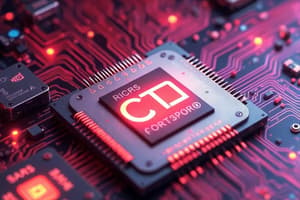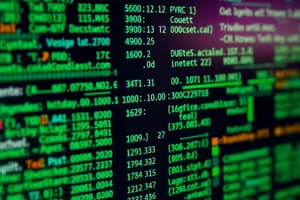Podcast
Questions and Answers
What is the smallest unit of measurement in a computer?
What is the smallest unit of measurement in a computer?
- Byte
- Kilobyte
- Bit (correct)
- Megabyte
Which operation is NOT typically performed by a computer?
Which operation is NOT typically performed by a computer?
- Arithmetic operations
- Output operations
- Sonic operations (correct)
- Input operations
What does data represent before it is processed by a computer?
What does data represent before it is processed by a computer?
- Information
- Knowledge
- Facts (correct)
- Context
What is the purpose of recovery operations in computer processing?
What is the purpose of recovery operations in computer processing?
How many bits are there in one Byte?
How many bits are there in one Byte?
What is the correct measurement for one Terabyte (TB) in bytes?
What is the correct measurement for one Terabyte (TB) in bytes?
Which of the following is NOT a type of operating system mentioned?
Which of the following is NOT a type of operating system mentioned?
What does the execution phase of the CPU process involve?
What does the execution phase of the CPU process involve?
Which storage option is associated with virtual servers?
Which storage option is associated with virtual servers?
Which component in a computer is specifically used to store recurring data for quick access?
Which component in a computer is specifically used to store recurring data for quick access?
Which of the following is NOT considered a measurement of computer performance?
Which of the following is NOT considered a measurement of computer performance?
How many bytes are in one Kilobyte (KB)?
How many bytes are in one Kilobyte (KB)?
What is the primary function of the Control Processing Unit (CPU)?
What is the primary function of the Control Processing Unit (CPU)?
Flashcards
What is a computer?
What is a computer?
An electronic device that takes data, processes it using arithmetic and logical operations based on stored instructions (programs), and outputs the results to different output units based on user requests.
What are the main computer operations?
What are the main computer operations?
The tasks a computer performs to transform raw data into meaningful information. These include taking in data (input), manipulating data (processing), displaying results (output), storing data (storage), retrieving data (recovery), and making logical comparisons.
What is data?
What is data?
Raw facts or figures entered into a computer for processing.
What is information?
What is information?
Signup and view all the flashcards
What is a bit?
What is a bit?
Signup and view all the flashcards
What is a Kilobyte (KB)?
What is a Kilobyte (KB)?
Signup and view all the flashcards
What is ROM?
What is ROM?
Signup and view all the flashcards
What is Cache?
What is Cache?
Signup and view all the flashcards
What is Cloud Storage?
What is Cloud Storage?
Signup and view all the flashcards
What is the main function of the CPU?
What is the main function of the CPU?
Signup and view all the flashcards
How does Cloud Storage work?
How does Cloud Storage work?
Signup and view all the flashcards
What factors affect computer performance?
What factors affect computer performance?
Signup and view all the flashcards
Study Notes
Computer Definition
- A computer is an electronic device receiving data to process it.
- It performs arithmetic and logical operations based on stored instructions (programs).
- The processed data is outputted to various units based on user requests.
Computer Types
- Desktop Computer: A computer with a separate monitor, keyboard, and mouse.
- Laptop Computer (PC Portable): A portable computer with an integrated screen, keyboard, and mouse.
Computer Operations
- Input Operations: Entering data into the computer.
- Output Operations: Displaying processed data.
- Logical Operations: Using comparisons and other logical tests.
- Arithmetic Operations: Performing mathematical calculations.
- Storage Operations: Saving and retrieving data.
- Recoveries: Restoring data lost during operations.
Computer Definitions
- Data: A collection of facts entered into the computer for processing.
- Processing: Operations performed on data, such as arranging, organizing, and manipulating it.
- Information: Results obtained after processing data; also known as processed data.
How a Computer Works
- Data is inputted.
- Data is processed.
- Processed data (information) is outputted.
Computer Measurement Units and Storage Capacity
- Bit: The smallest unit of computer data; either 0 or 1.
- Byte: 8 bits; used to store a single character.
- Kilobyte (KB): 1024 bytes
- Megabyte (MB): 1024 KB
- Gigabyte (GB): 1024 MB
- Terabyte (TB): 1024 GB
- Petabyte (PB): 1024 TB
- Exabyte (EB): 1024 PB
Computer Components
- Hardware: Physical components like the monitor, keyboard, mouse, CPU, etc.
- Software: Operating systems and applications that control the hardware.
Control Processing Unit (CPU)
- The CPU is the brain of the computer.
- It performs three main functions:
- Fetch: Reading instructions from memory to process them.
- Decode: Deconstructing instructions to understand what to do.
- Execute: Carrying out the decoded instructions.
RAM (Random Access Memory) and ROM (Read-Only Memory)
- RAM: Temporary storage; used in computer operations. Volatile memory.
- ROM: Permanent storage; instructions needed for startup. Non-volatile memory.
Cache Memory
- Special memory that holds frequently used instructions or data for quick access, enhancing computer speed.
Cloud Storage
- A storage model employing virtual servers.
- Data is stored on servers managed by hosting companies.
- Users buy or rent storage capacity from these companies.
Operating Systems
- Operating Systems: Software controlling computer hardware, enabling operations and application execution.
- Examples: Disk Operating System (DOS), Microsoft Windows, Mac OS, Linux, and UNIX.
Smart Device Operating Systems
- iPhone Operating System (iOS):
- Android:
- CPU speed: A measurement of computer processing capacity.
- Random memory size: A measurement of temporary storage capacity.
- Hard disk capacity: A measurement of permanent storage capacity.
Computer Performance Measurement
- Computer performance is measured by processing speed, memory capacity and hard drive storage.
Questions (From Slides)
- Input Devices: Examples of input devices include keyboards, mice, and scanners.
- Cloud Storage Process: Cloud storage uses the internet.
- Megabyte Size: Megabyte (MB) size is 1024 kilobytes.
- Cloud Storage Examples: Examples like OneDrive, Dropbox, and Google Drive.
- Computer Performance Measurement: Measured by the Central Processing Unit (CPU) speed, memory size and hard disk capacity.
Studying That Suits You
Use AI to generate personalized quizzes and flashcards to suit your learning preferences.



